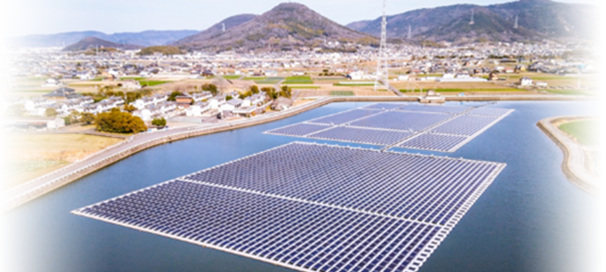[Business Strategies]
New Business &
Construction Peripheral Business
[Business Strategies]
New Business &
Construction Peripheral Business
[Business Strategies]
New Business & Construction Peripheral Business

To satisfy diversifying customer needs and address dramatically changing social issues, we take on challenges in new business areas regardless of the conventional areas of business and styles adopted in the broader construction industry.
We are particularly focusing on projects that address social issues and renewable energy projects. For example, these include participation in the operation of public facilities using private sector expertise and renewable energy using unused land or reservoirs. We provide various solutions combining our capabilities and new ideas.
Based on the Sixth Medium-term Management Plan (2019–2021), we focused our efforts on the three businesses of (1) renewable energy-related, (2) PPP/PFI, and (3) medical and pharmaceutical facility engineering.


Our composting toilet is a recycling toilet that uses Japanese cedar chips. Unlike the traditional toilet, it does not require connections with the sewage system and septic tank or sewage pumping work by a pumper truck, so it can be installed in mountainous areas and remote islands on which it is hard to install the sewage system and plumbing. The power of microbes helps prevent smelly toilet odor.
As a part of engineering services, we offer consulting services for the building environment that involves heat, noise and vibration problems. We particularly have an extensive track record of countermeasures against the heat of summer in factories and warehouses. Temperatures inside factories and warehouses are more likely to rise than those in other types of buildings. Taking countermeasures against the heat of summer in particular is increasingly important these days in terms of the impact on productivity and health. However, installing cooling equipment in such factories and warehouses to lower the inside temperatures is not a realistic solution because it requires an enormous amount of power and energy. We determine what causes the heat in each building, and based on the identified factors, we propose energy-saving, efficient and eco-friendly countermeasures against the heat of summer as most appropriate countermeasures for the building, for example, sprinkling roofs with water and natural ventilation.
In fiscal 2021, we will continue focusing our efforts on the three businesses of renewable energy-related, PPP/PFI, and medical and pharmaceutical facility engineering. In addition, we will aim to create and develop new businesses and business areas. Among these, in the renewable energy-related business, we plan to start construction work on one new solar power generation plant, and are making specific studies into the solar power generation and micro-hydroelectric power generation businesses in Japan and elsewhere. In medical and pharmaceutical facility engineering, we will aim to increase orders for the Company’s original technology and products, with a focus on the market stimulation related to COVID-19, in addition to the existing anti-cancer drugs and regenerative medicine markets. In new businesses and business areas, we will aim to commercialize new businesses using our capabilities, and start considering how we can make use of hydrogen, which can be used in the key technology for decarbonization.
To thrive in the new normal era that emerged after the onset of the COVID-19 pandemic, we will develop new business opportunities with our diverse talent from our diverse perspectives. We will aim to enter new realms by capturing what is happening around the world and market needs, using internal and external technologies and knowledge, and applying the existing technologies to other areas.